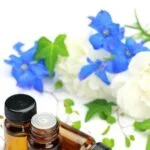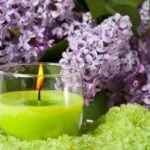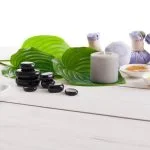Over the past few years, aromatherapy has gained immense popularity for its potential benefits in promoting overall well-being and relaxation. But did you know that these aromatic oils can also be beneficial for your skin? In this article, we will dive into the world of aromatherapy oils and explore whether using them on your face is a safe and effective option to enhance your skincare routine.
Aromatherapy oils are derived from various plant sources and are known for their powerful fragrances. They have been used for centuries in traditional medicine practices due to their potential therapeutic properties. These oils can be extracted from flowers, leaves, stems, roots, or even the rind of citrus fruits. However, it is important to note that not all essential oils are suitable for facial use.
When it comes to skincare, different people have unique skin types – oily, dry, sensitive – each requiring specific care. Aromatherapy oils also have distinctive qualities that make them ideal for addressing different skin concerns. Understanding which oils are suitable for your particular skin type is crucial in order to reap the maximum benefits without any adverse reactions.
In the following sections of this article, we will explore the potential benefits of using aromatherapy oils on your face, as well as safety precautions and popular oil recommendations from experts. It is essential to approach aromatherapy with caution and follow proper guidelines to ensure a positive experience and avoid any unwanted complications or irritations. So let’s embark on this aromatic journey together and discover how these natural wonders can contribute to achieving healthy and rejuvenated skin.
Understanding Aromatherapy Oils
Aromatherapy oils, also known as essential oils, are highly concentrated plant extracts that have been used for centuries for their therapeutic properties. These oils are derived from various parts of plants such as flowers, leaves, bark, and roots through methods like distillation or cold-press extraction. Each type of oil possesses unique qualities that make it suitable for different purposes.
There is a wide range of aromatherapy oils available, each with its own distinct scent and potential benefits. Some popular examples include lavender oil, which is known for its calming and soothing properties; tea tree oil, which is commonly used for blemish-prone skin due to its antibacterial properties; and rosehip oil, which is believed to have rejuvenating effects on the skin.
When selecting aromatherapy oils for facial use, it is important to consider your individual skin type and concerns. For oily or acne-prone skin, oils such as tea tree, peppermint, or lemon may help to balance sebum production and reduce breakouts. Dry skin can benefit from moisturizing oils like rosehip, argan, or chamomile. Those with sensitive skin may find relief with gentle oils like lavender or chamomile.
It’s crucial to note that not all essential oils are safe to use directly on the skin without dilution. Most aromatherapy oils need to be diluted in a carrier oil or cream before application to avoid potential irritation. Additionally, it’s recommended to perform a patch test prior to using any new oil on the face to ensure there are no adverse reactions.
Overall, understanding the types of aromatherapy oils available and their specific qualities can help you make informed choices when incorporating these oils into your skincare routine. Consulting with skincare professionals or aromatherapy experts can provide further guidance on selecting the right oils for your needs and ensuring proper usage guidelines are followed for optimal results.
Skin Types and Aromatherapy Oils
When it comes to using aromatherapy oils on the face, one important factor to consider is your skin type. Different skin types have different needs and may respond differently to various essential oils. Understanding which oils are suitable for your specific skin type can help you maximize the benefits of aromatherapy for your skin.
For oily skin, essential oils that have astringent properties can be beneficial in regulating oil production and minimizing the appearance of pores. Tea tree oil is often recommended for oily or acne-prone skin due to its antibacterial properties. It helps control excess sebum production and can also help reduce blemishes. Other suitable essential oils for oily skin include clary sage, lemon, and grapefruit.
Dry skin can benefit from essential oils that provide deep hydration and nourishment. Rosehip seed oil is known for its moisturizing properties and can help improve the texture of dry skin. Geranium oil is also beneficial as it helps balance oil production while providing hydration. Additionally, chamomile and lavender oils are often used to soothe dry, irritated skin.
Sensitive skin requires extra care and caution when using aromatherapy oils. It’s essential to choose gentle oils that won’t cause irritation or allergic reactions. Calendula oil is a popular choice for sensitive skin due to its soothing and calming properties. Frankincense oil has anti-inflammatory properties that can help reduce redness and irritation in sensitive skin. Lavender oil is another option as it has a gentle nature and promotes overall skin health.
| Skin Type | Recommended Essential Oils |
|---|---|
| Oily | Tea Tree, Clary Sage, Lemon, Grapefruit |
| Dry | Rosehip Seed, Geranium, Chamomile, Lavender |
| Sensitive | Calendula, Frankincense, Lavender |
Remember that these recommendations are not exhaustive and may vary depending on individual skin sensitivities or allergies. It is always advisable to perform a patch test before using any new essential oil on your face and consult with a skincare professional or aromatherapist to determine the best options for your specific needs.
Potential Benefits
Aromatherapy oils have gained significant popularity in recent years for their potential benefits on the skin. When used on the face, these oils can provide hydration, rejuvenation, and soothing properties that contribute to healthier and more vibrant skin. By understanding the qualities of various aromatherapy oils and knowing which ones are suitable for different skin types, individuals can harness the potential benefits of these oils for their facial skincare routine.
Hydration is essential for maintaining healthy skin, and certain aromatherapy oils can help achieve this. Oils like rosehip seed oil and jojoba oil are rich in fatty acids, which nourish and moisturize the skin. These oils create a protective barrier that helps lock in moisture and prevent transepidermal water loss. By incorporating these oils into your skincare routine, you can ensure that your face remains hydrated throughout the day.
In addition to hydration, aromatherapy oils also offer rejuvenating effects. Oils such as frankincense and rosemary have antioxidant properties that help fight against free radicals, which are responsible for premature aging. These oils promote cell regeneration and stimulate collagen production, resulting in firmer and more youthful-looking skin. Regular use of aromatherapy oils with rejuvenating properties can help reduce the appearance of fine lines and wrinkles, giving your face a refreshed and revitalized appearance.
Soothing properties are another significant benefit of using aromatherapy oils on the face. Many essential oils have anti-inflammatory and calming effects that can help soothe irritated or sensitive skin. Chamomile oil and lavender oil are commonly used for their soothing properties due to their ability to reduce redness, inflammation, and irritation. These oils can be especially beneficial for individuals with sensitive or eczema-prone skin, as they provide relief from discomfort while promoting overall skin health.
Overall, using aromatherapy oils on the face has several potential benefits ranging from hydration to rejuvenation to soothing properties. However, it is important to note that individual skin needs may differ, and some oils may not be suitable for certain skin types or conditions.
Additionally, it is crucial to follow safety precautions such as proper dilution and patch testing to avoid any adverse reactions. Consulting with skincare professionals and aromatherapy experts can provide valuable insights and recommendations on the best practices and specific oil blends for facial use.
Safety Precautions
The Importance of Dilution
When using aromatherapy oils on the face, it is crucial to understand the importance of dilution. Pure essential oils are highly concentrated and can be too potent for direct application to the skin. Diluting the oils with a carrier oil is necessary to ensure safety and minimize any potential adverse reactions. Some commonly used carrier oils for dilution include jojoba oil, almond oil, and coconut oil.
The general rule of thumb for diluting aromatherapy oils is to use a ratio of 1% to 5% essential oil to carrier oil. For facial use, it is recommended to start with a lower concentration, such as 1% or less, especially for those with sensitive skin. As you become more accustomed to using aromatherapy oils on your face and learn how your skin responds, you can gradually increase the concentration if desired.
Patch Testing Before Use
Before applying any new aromatherapy oil on your face, it is important to perform a patch test on a small area of skin to check for any potential allergic reactions or irritation. Choose an inconspicuous spot, such as the inner forearm, and apply a small amount of diluted essential oil. Leave it on for at least 24 hours and monitor the area for any adverse reactions like redness, itching, or swelling.
If you experience any negative reactions during the patch test or notice discomfort after applying an essential oil on your face, it is best to avoid using that particular oil altogether. Everyone’s skin reacts differently, and what works well for others may not work well for you.
Proper Usage Guidelines
To ensure safe usage of aromatherapy oils on the face, it is important to follow some general guidelines:
1. Keep the oils away from the eyes: Aromatherapy oils should never come into contact with the eyes, as they can cause irritation and discomfort.
2. Use a clean dropper or pipette: Avoid direct contact between the essential oil bottle and your skin to prevent contamination. Use a clean dropper or pipette to measure out the required amount of oil.
3. Store oils properly: Essential oils should be stored in dark glass bottles away from heat and sunlight to maintain their potency and prevent degradation.
4. Pregnancy and medical conditions: If you are pregnant, breastfeeding, or have any underlying medical conditions, it is important to consult with a healthcare professional before using aromatherapy oils on your face.
By following these safety precautions and guidelines, you can minimize the risk of irritation or adverse reactions when using aromatherapy oils on your face. It is always best to err on the side of caution and seek guidance from skincare professionals or aromatherapy experts if needed.
Popular Aromatherapy Oils for the Face
Lavender Oil for Calming
One popular aromatherapy oil for the face is lavender oil, which is well-known for its calming properties. Lavender oil can benefit all skin types, making it a versatile choice for those looking to incorporate aromatherapy into their skincare routine. Its gentle and soothing nature makes it particularly effective for dry or sensitive skin.
Lavender oil has been found to have anti-inflammatory properties, helping to reduce redness and irritation on the skin. It also possesses antioxidant properties, which can help protect the skin from free radicals that cause premature aging. Furthermore, the scent of lavender oil is known to promote relaxation and reduce stress, making it an excellent addition to your nighttime skincare routine.
Tea Tree Oil for Blemish-Prone Skin
For individuals with blemish-prone or acne-prone skin, tea tree oil is a popular choice. Tea tree oil has natural antibacterial properties that can help fight off bacteria on the skin that may lead to breakouts. It also has anti-inflammatory properties that can help reduce redness and swelling associated with acne.
When using tea tree oil on the face, it’s important to remember to dilute it properly as it can be quite strong and potentially irritating if applied directly. Mixing a few drops of tea tree oil with a carrier oil such as jojoba or almond oil can help ensure safe usage.
Other oils commonly used for blemish-prone skin include rosemary and geranium essential oils, which both have antibacterial qualities that may aid in reducing acne-causing bacteria on the skin’s surface.
Rosehip Seed Oil for Anti-Aging
Rosehip seed oil is another popular aromatherapy option for those looking to address signs of aging on their face. This oil is rich in antioxidants and essential fatty acids that can promote collagen production and help improve skin elasticity. This can result in a more youthful appearance and a reduction in the appearance of fine lines and wrinkles.
In addition to its anti-aging benefits, rosehip seed oil also contains vitamins A and C, which can help brighten the skin and even out its tone. It is suitable for all skin types, but individuals with dry or mature skin may particularly benefit from its hydrating properties.
It’s important to note that while these oils have shown potential benefits for specific skin concerns, individual results may vary. It’s always advisable to patch test any new product on a small area of skin before applying it fully to ensure compatibility and minimize the risk of irritation or allergic reactions.
Methods of Application
Aromatherapy oils can be incorporated into skincare routines in various ways to maximize their benefits for the face. Here are some popular methods of application that can help you enjoy the rejuvenating effects of aromatherapy oils:
1. Facial Massages: One effective way to use aromatherapy oils on the face is through facial massages. Massaging the oil into the skin helps promote better absorption and enhances its therapeutic properties. To do a facial massage, mix a few drops of your chosen aromatherapy oil with a carrier oil like coconut or jojoba oil. Gently massage the mixture onto your face using upward circular motions, focusing on areas where you want to address specific concerns.
2. Steam Inhalation: Another method to incorporate aromatherapy oils into your skincare routine is through steam inhalation. This method not only benefits the skin but also provides a soothing and relaxing experience. Fill a bowl with hot water (not boiling), add a few drops of your desired aromatherapy oil, such as lavender or chamomile, and cover your head with a towel. Lean over the bowl and inhale deeply for about 5-10 minutes while keeping your eyes closed.
3. Homemade Face Masks: Aromatherapy oils can also be added to homemade face masks for targeted skincare benefits. Depending on your skin type and concerns, you can create customized face masks using ingredients like clay, honey, yogurt, or oats combined with essential oils such as tea tree oil for blemish-prone skin or rosehip oil for anti-aging effects.
Mix these ingredients together to form a paste-like consistency and apply it evenly onto your face. Leave it on for 15-20 minutes before rinsing off with lukewarm water.
It’s important to note that when using aromatherapy oils on the face, it’s essential to choose high-quality oils and dilute them properly to avoid skin irritation. It’s also advisable to conduct a patch test before applying any new oil to your face, especially if you have sensitive skin. Additionally, always follow the recommended usage guidelines provided by skincare professionals or aromatherapy experts for safe and effective results.
By incorporating these different methods of application into your skincare routine, you can enjoy the potential benefits of aromatherapy oils for your face while indulging in a pampering self-care experience. Remember to listen to your skin’s needs and consult professionals for tailored advice and recommendations based on your individual requirements.
Expert Advice and Recommendations
When it comes to using aromatherapy oils on the face, seeking expert advice can offer valuable insights and recommendations. Skincare professionals and aromatherapy experts have extensive knowledge about different skin types, specific oil blends, and best practices for facial use. Their expertise can help individuals make informed decisions about incorporating aromatherapy oils into their skincare routines.
One important aspect highlighted by experts is the significance of understanding individual skin needs. People with oily skin may benefit from oils that have astringent properties to regulate sebum production, such as tea tree or geranium oil. On the other hand, individuals with dry or sensitive skin might benefit from moisturizing oils like rosehip or chamomile. Consulting with a skincare professional or aromatherapist can provide personalized recommendations based on an individual’s skin type and concerns.
Experts also emphasize the significance of dilution when using essential oils on the face. Most essential oils are highly concentrated and should be diluted with a carrier oil or water before application to avoid irritation or adverse reactions.
In addition, patch testing is recommended to check for any potential allergies or sensitivities before applying an essential oil blend to your face. This involves applying a small amount of diluted oil onto a small area of skin, waiting 24 hours, and observing for any negative reactions.
Furthermore, professionals suggest following proper usage guidelines to ensure safe and effective application of aromatherapy oils on the face. It is generally advised to start with small amounts of oil in a blend (around 1-2% concentration) and gradually increase if desired. Some experts recommend avoiding direct application of undiluted essential oils to certain areas of the face like around the eyes or lips due to their sensitive nature.
Conclusion
In conclusion, aromatherapy oils can be a valuable addition to your skincare routine when used properly and with caution. Throughout this article, we have explored the rising popularity of aromatherapy and its potential benefits for the skin. We have also discussed the different types of oils used in aromatherapy, their qualities, and how they can benefit various skin types.
It is important to remember that not all aromatherapy oils are suitable for use on the face. Understanding your individual skin needs and identifying the right oils for your skin type is crucial in achieving positive results. Oily, dry, sensitive, and blemish-prone skin all require different types of oils to address specific concerns.
When using aromatherapy oils on the face, it is necessary to exercise caution and follow safety precautions. Dilution is key to avoid any adverse reactions or irritation. Patch testing should always be done before applying any oil directly to the face. Additionally, it is recommended to consult skincare professionals or aromatherapy experts who can provide personalized advice and recommendations based on your specific needs.
Frequently Asked Questions
Can You Use Aromatherapy Essential Oils on Your Face?
Aromatherapy essential oils can indeed be used on the face in specific instances, but caution should be exercised. Not all essential oils are suitable for direct application to the face, as they may cause skin irritation or sensitization. It is important to dilute essential oils before use and perform a patch test on a small area of skin to ensure compatibility.
Some essential oils that are commonly used on the face include lavender, tea tree, and chamomile, which have soothing properties and can help with various skin concerns such as acne or dryness. However, it is always recommended to consult with a qualified aromatherapist or dermatologist before using any essential oil on your face.
Are Aromatherapy Oils Safe for Skin?
While aromatherapy oils can provide a range of benefits for the skin, it is crucial to exercise caution and ensure proper usage. Not all aromatherapy oils are safe for direct application to the skin, particularly when undiluted. Essential oils are highly concentrated substances that contain active compounds, and some individuals may have sensitivities or allergies to certain oils that can lead to skin reactions.
It is advisable to dilute essential oils with carrier oils such as coconut or jojoba oil before applying them topically onto the skin. Additionally, each person’s skin is unique, so what works well for one individual may not work for another. Therefore, it is always prudent to do a patch test first and seek advice from professionals if needed.
What Essential Oils Should You Not Put on Your Face?
Certain essential oils should generally be avoided when applying directly to the face due to their potential irritation or sensitization effects on the delicate facial skin. Among these are cinnamon bark oil, oregano oil, clove oil, lemongrass oil, and thyme oil. These oils tend to be potent and may cause discomfort or adverse reactions such as redness or itching when applied directly without proper dilution or underestimating their intensity.
It’s also important to take note of any allergies or sensitivities one might have, as it can vary from person to person. Prior research and consultation with professionals are highly recommended to ensure the safe usage of essential oils on the face.

Are you looking for a natural way to improve your health and wellbeing?
If so, aromatherapy may be the answer for you.





